Michigan Five Fluke Freshmen
The Michigan Five Fluke Freshmen is the name given to five members (Raymond Clevenger, Billie Farnum, John Mackie, Paul Todd, and Wes Vivian) of the U.S. House of Representatives from Michigan that were elected in the Democratic landslide of 1964 and subsequently defeated just two years later by a Republican resurgence. All of the five were one-term congressmen. It was the last time that a state would have five freshmen members of Congress defeated for reelection.
1964: LBJ landslide
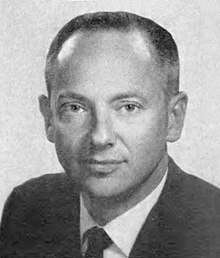
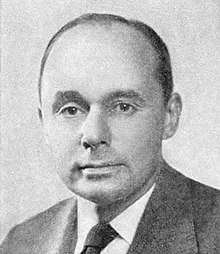
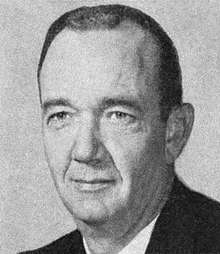
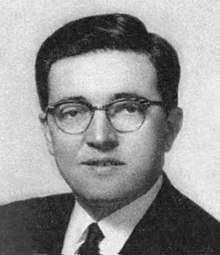
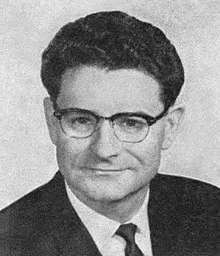
With President Lyndon B. Johnson taking over 67% of the vote in Michigan, the Democrats were able to win five districts and change the delegation from 12 to 7 Republican to 12 to 7 Democratic. The Democratic gains took place in District 2 (based in the Ann Arbor area), District 3 (set around Kalamazoo and Battle Creek), District 7 (Flint and its surrounding region), District 11 (northern lower Michigan and the Upper Peninsula), and District 19 (suburban Detroit). Nationally Democrats gained 36 seats from the Republicans in the House.
| Party | Candidate | Votes | % | |
|---|---|---|---|---|
| Democratic | Wes Vivian | 77,806 | 50.5 | |
| Republican | George Meader (Inc) | 76,280 | 49.5 | |
| Party | Candidate | Votes | % | |
|---|---|---|---|---|
| Democratic | Paul Todd | 85,001 | 52.7 | |
| Republican | August Johansen (Inc) | 76,350 | 47.3 | |
| Party | Candidate | Votes | % | |
|---|---|---|---|---|
| Democratic | John Mackie | 104,115 | 65.7 | |
| Republican | Claude Sadler | 54,307 | 34.3 | |
| Party | Candidate | Votes | % | |
|---|---|---|---|---|
| Democratic | Raymond Clevenger | 86,557 | 53.3 | |
| Republican | Victor Knox (Inc) | 75,955 | 46.7 | |
| Party | Candidate | Votes | % | |
|---|---|---|---|---|
| Democratic | Billie Farnum | 88,441 | 53.4 | |
| Republican | Richard Kuhn | 77,204 | 46.6 | |
1966: Republican Resurgence
The unpopularity of President Johnson's Great Society, rising crime, radical campus protests, and racial riots coupled with the coattail effect of popular Governor George W. Romney at the top of the state ticket all led to a downturn for the Democratic Party. The Republicans succeeded in recapturing the five districts they lost in 1964 and returned the delegation to a 12 to 7 Republican majority. Nationally the Republicans gained 47 seats from the Democrats in the House.
| Party | Candidate | Votes | % | |
|---|---|---|---|---|
| Republican | Marvin Esch | 65,205 | 51 | |
| Democratic | Wes Vivian (Inc) | 62,536 | 49 | |
| Party | Candidate | Votes | % | |
|---|---|---|---|---|
| Republican | Garry E. Brown | 68,912 | 52.2 | |
| Democratic | Paul Todd (Inc) | 62,984 | 48.8 | |
| Party | Candidate | Votes | % | |
|---|---|---|---|---|
| Republican | Don Riegle | 71,166 | 54 | |
| Democratic | John Mackie (Inc) | 60,408 | 46 | |
| Party | Candidate | Votes | % | |
|---|---|---|---|---|
| Republican | Philip Ruppe | 70,820 | 51.8 | |
| Democratic | Raymond Clevenger (Inc) | 65,875 | 48.2 | |
| Party | Candidate | Votes | % | |
|---|---|---|---|---|
| Republican | Jack McDonald | 76,884 | 57 | |
| Democratic | Billie Farnum (Inc) | 57,907 | 43 | |
References
- The Almanac of American Politics 1972